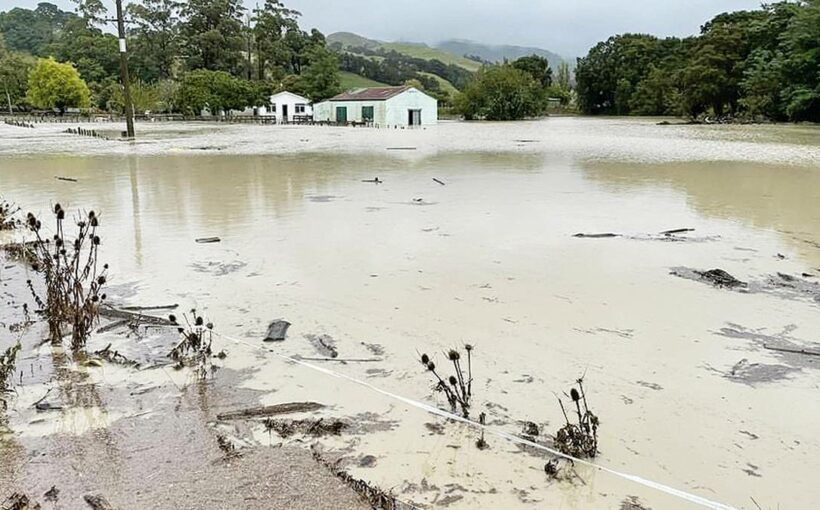Widespread damage from two fierce North Island storms that struck within days is expected to leave an insurance bill well into the tens of millions of dollars.
It comes after insurers paid out a record $324 million in extreme weather claims last year, the largest being the devastating July floods that saw large swathes of both islands inundated by floodwater after days of torrential rain.
The country’s biggest general insurer, IAG, said as of Friday morning there had been 2554 claims lodged- and more were expected in coming days from the hard-hit East Coast region, with more bad weather forecast and homeowners still to take stock of their situation.
A further 800 claims have been handled by AA Insurance for home, contents and car claims from this event and the insurer says they are continuing to see new claims come in.
“At this stage we’ve had over $3m estimated damage in total, and we expect this to increase,” said head of home claims Tom Bartlett.
“Claims have included a mixed bag of damage from leaking roofs and windows to totally flooded homes and garages. We’ve also seen a significant amount of motor claims for flooded cars.”
An IAG spokesperson said claims relating to storm damage had come in from across the top of the North Island since the first deluge struck the top of the country overnight Sunday.
Within the first 24 hours of the first record-breaking rainstorm hitting and sweeping down the country IAG, known by their brands AMI, State and NZI, had dealt with more than 1000 claims relating to damaged vehicles, homes and businesses, predominantly across Northland, Auckland, Waikato and Bay of Plenty.
But with floodwaters, slips and road washouts isolating communities on the East Coast it was difficult to get a gauge on the extent of the damage as many homes were still to be surveyed by insurance assessors, said the spokesperson.
However, there were already many heartbreaking stories emerging as people returned to homes ruined by floodwater, and treasured possessions destroyed.
A gutted Emergency Management Minister Kiri Allan described the damage to roads and property at Tokomaru Bay as “devastating”, noting this was the second time in nine months the community had been hit.
The New Zealand Insurance Council said the projected payout from the latest severe weather to hit the country in the past five days would be big.
“It takes us a few weeks to get the figures through on provisional costs. We would expect to have it in the low tens of millions,” said chief executive Tim Grafton.
But he said the figure of insured losses will only be a part of the total picture, and much of the damage costs will fall under local councils and other agencies.
Both the Insurance Council and AA confirmed an increase in extreme weather events in the past year.
“We’ve got to, as a country, think about how we invest in reducing climate change risk, that’s adaptation to climate change,” said Grafton.
“We’ve managed over decades to build in the wrong places, places that frequently flood, we have many properties built in those areas.
“We’ve got to start thinking about how we invest … so that really does need a case-by-case assessment of the flood risks and what makes sense in terms of the cost-benefit in investing in risk-reduction measures.
“Some councils are starting to look to that … but it will take significant funding to address these issues.”
Last year insurers paid out $62m after parts of West Auckland was inundated by flash flooding in late August.
That weather event saw 2677 claims lodged, with just under half of the cost for 1956 house and contents claims, and the rest covering commercial and motor claims.
The largest and most expensive natural disaster took place in July, when upper parts of the North Island and lower parts of the South Island, including Westport, were inundated by floodwater. That saw $140m paid out in claims.
On Thursday Allan announced a $175,000 contribution to the Mayor Relief Fund for Tairāwhiti region to help get the clean-up under way as soon as possible.
Local Government New Zealand national council chairman Stuart Crosby said damage caused from severe weather events would inevitably have a significant impact on council budgets.
While Waka Kotahi was responsible for major highway repairs, there were often costs related to local roads and other infrastructure repairs such as broken pipes.
The flood-hit region and most of the East Coast of the North Island remains under a heavy rain warning.
Source: Read Full Article

/cloudfront-ap-southeast-2.images.arcpublishing.com/nzme/HXZ6C7F7QKQVJ2CGP57NRQH7RY.jpg)
/cloudfront-ap-southeast-2.images.arcpublishing.com/nzme/7MOFAJ7ODX45MZ4X3CHKA437YI.jpg)
/cloudfront-ap-southeast-2.images.arcpublishing.com/nzme/FXNSVPVQWIJA4ONMJFLA5547WE.jpg)
/cloudfront-ap-southeast-2.images.arcpublishing.com/nzme/7H665TXIGXN2HIHZ4HIWI4GQW4.jpg)